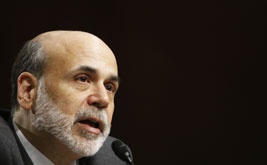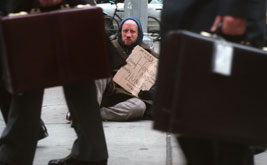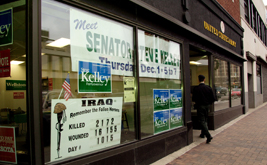
The Soros Syndrome The Soros Syndrome
George Soros's gift of $100 million to Human Rights Watch doesn't come without strings attached.
Sep 15, 2010 / Beat the Devil / Alexander Cockburn
After Summers Comes the Fall After Summers Comes the Fall
Lawrence Summers should be fired for the part he played in bringing about the financial crisis that cost so many Americans their jobs.
Sep 15, 2010 / Robert Scheer
Major Student Loan Mistakes, and Ways to Avoid Making Them Major Student Loan Mistakes, and Ways to Avoid Making Them
The economy's long nosedive has done more than raise unemployment rates and housing foreclosures—it's also contributed to a devastating increase in the amount of student debt. Following a recent Education Department report on debt repayment figures, Gawker compiled a list of the top ten universities for student debt, which is topped by NYU's staggering $659 million total. This year also marked the first time in history that outstanding student loan debt exceeded outstanding total credit card debt, with student loan debt nationwide increasing at a rate of about $2853.88 per second. It's a grim landscape for students who've borrowed money, and one that is rife with ways to exacerbate the amount owed. In light of this, Sarah Deveau has provided a helpful list of tips and practices to avoid via the San Francisco Chronicle. Highlights from the pieces, "The 6 Worst Student Loan Mistakes You Can Make" include smart warnings against tempting practices like falsifying information on a student loan application, spending loan money on non-essential purchases and missing payments. "Some experts suggest that your monthly student loan payment should be no more than 10% of your expected salary," Deveau writes. "Calculate your monthly loan payments based on a 10-year repayment schedule, including interest, the find out the average starting salary for your career choice. If your loan payments will be higher than 10%, look at reducing the amount you borrow, either through producing more income or switching to a less expensive program." The bottom line, she says, is this: A student loan is often the first large sum of money a young adult must manage themselves. Avoiding common money mistakes when it comes to financing your college education is crucial to graduating with only good debt, and as little of it as possible. Some of it seems fairly no-brainer, but Deveau lays it out in concrete, practical terms that should make a lot of sense—especially to students taking on loans for the first time.
Sep 10, 2010 / StudentNation / Carrie Battan

The Breakdown: How Can the Fed Help the Economy? The Breakdown: How Can the Fed Help the Economy?
In a major speech last month, Federal Reserve Chairman Ben Bernanke pledged to buy more longer-term securities if the economy continues to worsen. But will this benefit really tric...
Sep 10, 2010 / Audio / Chris Hayes
Wall Street Needs to Change, Not Obama Wall Street Needs to Change, Not Obama
While no one said that reforming Wall Street would be easy for President Obama, the big-money backlash against his proposals has been surprisingly swift and screechy.
Sep 9, 2010 / Blog / Katrina vanden Heuvel

It’s Not the Party—It’s the Policies It’s Not the Party—It’s the Policies
Inequality has risen under Republicans and Democrats when they’ve embraced neoliberalism.
Sep 9, 2010 / Books & the Arts / Robert Pollin

Good Policy, Good Politics Good Policy, Good Politics
No one should mistake GOP protest for an indication that Obama's commitment to $50 billion in infrastructure spending is sufficient to tackle unemployment. It's a start, but it's n...
Sep 9, 2010 / Editorial / The Editors

It’s Better Over There It’s Better Over There
In Germany, a strong social safety net keeps people from plunging into the abyss. Why are we so averse to having that security in the United States?
Sep 2, 2010 / Column / Katha Pollitt

Unequal Sacrifice Unequal Sacrifice
Why are poorer and less-educated citizens more likely to die in America's wars?
Sep 2, 2010 / Books & the Arts / Andrew J. Bacevich
Busted: Stories of the Financial Crisis Busted: Stories of the Financial Crisis
The one thing that a thousand books written from within the financial crisis won't contemplate is the possibility of an unhappy ending for capitalism.
Sep 2, 2010 / Books & the Arts / Joshua Clover
